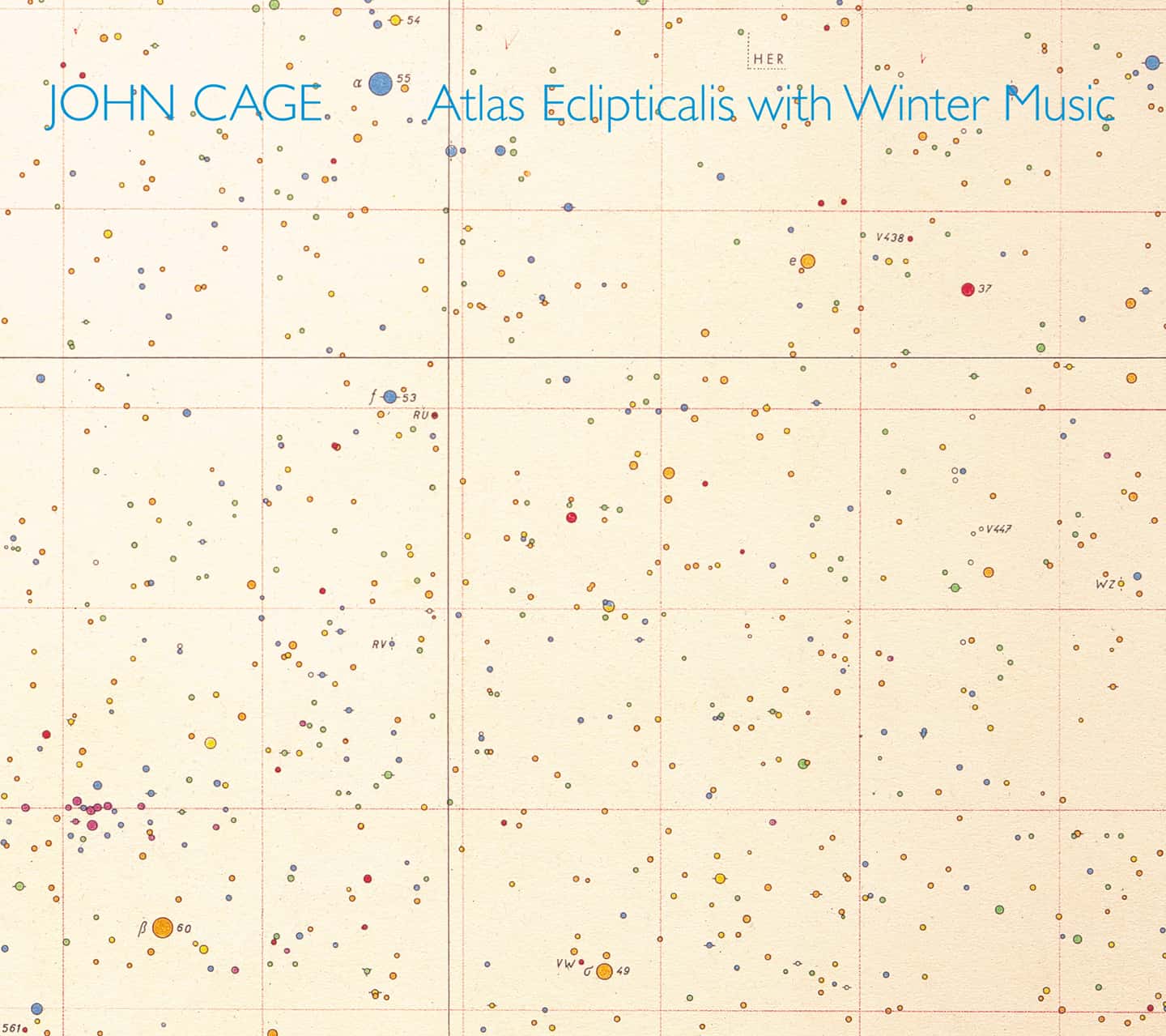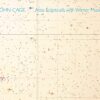Cage Edition 2-Atlas Eclipticalis With Winter Music
Atlas eclipticalis for up to 86 instruments, performed here by flute, clarinet, trumpet, trombone, violin, violoncello, and 2 percussion, (1st work) and orchestra (2nd work); Winter music for 1 to 20 pianos, performed here by 3 pianos (1st work) and 20 pianos (3rd work) Includes program notes in English by John Cage, Matthew Kocmieroski, Don Gillespie, and Stephen Drury, with French and German translations on insert. Includes program notes. Streaming audio. The 1st work originally released as a set of 4 LPs by Mode Records (mode 3/6) Title from container. Title from image of compact disc cover on Web page (viewed Nov. 21, 2008) The New Performance Group (Thomasa Eckert, Bun-Ching Lam, Roger Nelson, pianos ; Paul Taub, flute ; William O. Smith, clarinet ; Jim Knapp, trumpet ; Julian Priester, trombone ; Ella Gray, violin ; Walter Gray, violoncello ; Matthew Kocmieroski, Jarrad Powell, percussion) (1st work) ; The Wesleyan Symphony Orchestra with The Hartt Contemporary Players and The Arditti Quartet (2nd work) ; John Cage (1st work), Melvin Strauss (2nd work), conductor ; The Callithumpian Consort (Alanna Battat, Johann Kovitz, Guy Livingston, Mina Yang, pianos) (3rd work) ; Stephen Drury, director (3rd work) The 1st work recorded live Dec. 11, 1983, Cornish Theater at the Cornish Institute, Seattle, Wash.; the 2nd work recorded live Feb. 26, 1988, Corwell Hall at Wesleyan University, Middletown, Conn.; the 3rd work recorded Mar. 1991, Jordan Hall, New England Conservatory. Also available as compact disc; previously issued as Mode Records mode 3/6.
CD 1 & 2
JOHN CAGE CONDUCTS JOHN CAGE:
Atlas Eclipticalis (1961)
for chamber ensemble
with Winter Music (1957)
for 3 pianos
Live performances, 11 December 1983
Cornish Theater at the Cornish Institute, Seattle, Washington
CD 1: Performance I, 6:30 pm (80:00)
CD 2: Performance II, 8:30 pm (79:59)
The New Performance Group
John Cage, conductor
FIRST TIME ON CD
Note: tape hiss and some distortion are present due to the limitations of the analogue source material
CD 3
COMPOSER SUPERVISED PERFORMANCES
RELEASED FOR THE FIRST TIME:
Atlas Eclipticalis (1961) (29:44)
for orchestra
Live performance, 26 February 1988
Crowell Hall at Wesleyan University, Middletown, Connecticut
The Wesleyan Symphony Orchestra with The Hartt Contemporary Players and The Arditti Quartet
Melvin Strauss, conductor
Winter Music (1957) (10:17)
for 20 pianos
The Callithumpian Consort: Alanna Battat, Johanna Kovitz, Guy Livingston
Mina Yang, pianos
Stephen Drury, director
(DDD recordings)
The long awaited reissue of Mode’s second LP set, remastered with bonus tracks.
Cage’s relationship with the Cornish Institute in Seattle dates back to the 1930s, when he taught there and performed as accompanist for many dance pieces. Cornish was also the scene of several of his musical discoveries and innovations.
Cage’s celebrated return to the Cornish Institute in 1983 led to these recordings of his conducting Atlas Eclipticalis performed simultaneously with Winter Music – a rare opportunity to hear Cage perform his own works.
Two complete 80-minute long performances are presented here, captured live in concert.
New 96khz/24-bit mastering made from the original analog tapes.
The original liner notes by John Cage and the New Performance Group’s Matthew Kocmieroski are supplemented with new essays on Atlas Eclipticalis by Cage’s long-time colleague and publisher Don Gillespie, and on Winter Music by Stephen Drury.
Originally released as a 4-LP set on Mode in 1986, reissued on CD for the first time.
BONUS TRACKS: FIRST RELEASE
The first recording of all 86 instrumental parts of Atlas Eclipticalis, recorded under Cage’s supervision at the “John Cage at Wesleyan Festival” in 1988 with all-star players including the Arditti Quartet, Alvin Lucier, Christian Wolff, Neely Bruce and others.
Winter Music, overdubbed by four pianists to perform the parts for 20 pianos, directed by acclaimed Cage interpreter Stephen Drury.
Reviews
John Cage
Atlas Eclipticalis with Winter Music
Mode 3/6
Originally released as a 4LP set back in the early days of Mode Records, the first two discs of this 3CD set document the two live performances of Cage’s 1961 orchestral work Atlas Eclipticalis played simultaneously with 1957’s Winter Music (in a version for three pianos) recorded at Seattle’s Cornish Institute on December 11th 1983. Disc three presents what the label rather grandly describes as an “all-star” recording of all 86 instrumental parts of Atlas Eclipticalis, (the first of its kind) recorded under the composer’s supervision at the John Cage At Wesleyan festival in 1988 – the “stars” include the Arditti Quartet, Alvin Lucier and Christian Wolff – and an version of Winter Music directed by Stephen Drury, overdubbing four pianists five times to get the required 20-piano result. As ever, the CDs are accompanied by an erudite and comprehensive set of liner notes, including, amongst other things, facsimiles of Cage’s handwritten performing instructions and essays on the works by the composer, Matthew Kocmieroski, Don Gillespie and Stephen Drury.
While not questioning for a moment Gillespie and Drury’s assertion that Atlas was the major Cage work of the 60s (like Concert for Piano and Orchestra was for the 50s and Sonatas and Interludes for the 40s), the Seattle performances are still a tough listen. One wonders whether it is really necessary to sit down and concentrate furiously all the way through, or let the mind wander (“if the mind wanders, let it”, as the composer once famously wrote). But even if you choose to spin this while you busy yourself with other more mundane activities such as picking mushrooms or consulting the I Ching, the occasional fortissimo percussion crashes will soon shake you out of Ambient mode. The fuller textures on the 1988 86-part version are more engrossing, though for my money the late orchestral number pieces 103 and 108 are more satisfying. The 20-piano version of Winter Music is much more fun, its multitracked jagged clusters and pointy staccatos getting almost funky. Cage completists who missed out on the earlier LP box set (me!) can rejoice; it’s a thrill to see this sitting on my shelves, even if I wonder how many times I’ll return to it in the years to come.
– Dan Warburton, www.paristransatlantic.com, April 2007
CAGE: Atlas Eclipticalis with Winter Music
The New Performance Group / John Cage; Hartt Contemporary Players, Arditti Quartet, The Wesleyan Symphony Orchestra / Melvin Strauss; The Callithumpian Consort (Alanna Battat, Johanna Kovitz, Guy Livingston, Mina Yang pf) / Stephen Drury MODE3/6 (3h 20′ • ADD/DDD)
Recorded live at the Cornish Theater, Seattle, on December 11, 1983; Crowell Hall, Wesleyan University, Middletown, CT, on February 26, 1988. From Mode originals.
The scandals are history: now we can appreciate Cage reaching for the stars
Originally Mode’s second release, issued on four LPs in 1986, the 1983 performances of Atlas eclipticalis and Winter Music played simultaneously have always felt like a seminal point of reference forJohn Cage fans. Atlas eclipticalis (1961) uses chance procedures “but in relation to the traced position of the stars,” Cage writes, the resulting orchestral polyphony being equivalent to a constellation of stars. Winter Music (1957) was designed for multiple pianos and notates a spectrum between single stabbing notes and tone clusters. Cage instructs players that chords, even when too notey for 10 fingers, must be played whole and that tones beyond reach are to be sounded via harmonics. The resonant mix of struck notes ricocheting against sustained harmonics is a beautiful thing, and hearing the two works piggybacking demonstrates how unerringly accurate randomness can be.
Historically, performances of Atlas eclipticalis have been prone to insurrection and mutiny. Leonard Bernstein’s performances in 1963 created one of the biggest scandals in the New York Philharmonic’s history. Some 40 years on, however, the beauty of this music seems unmistakable. Cage indicates that its character is best realised when care is taken to produce acute contrasts of loud and soft/short and long, but there’s magic beyond this state of black and white. Going to such extremes also guarantees a robust middle ground of supplementary colliding textures and coincidences of note pattern.
There were two performances on one day: the first prodigiously fluid, with winning inevitability about the music’s direction from its first note; the second with many more awkward corners and moments where the musicians work hard to define purpose and momentum. But both are an honest response to how Cage’s demands are set up. The fact the ensemble embraces musicians with dual interest in improvisation and composition helps, giving the ensemble a potent “lived-in” feel.
Adding stimulating context to the original release are separate performances of Atlas Eclipticalis and Winter Music, and the sonorous subterranean echoes of Winter Music are brilliantly captured by Stephen Drury’s ensemble. Christmas just came early.
– Philip Clark, Gramophone, September 2007


